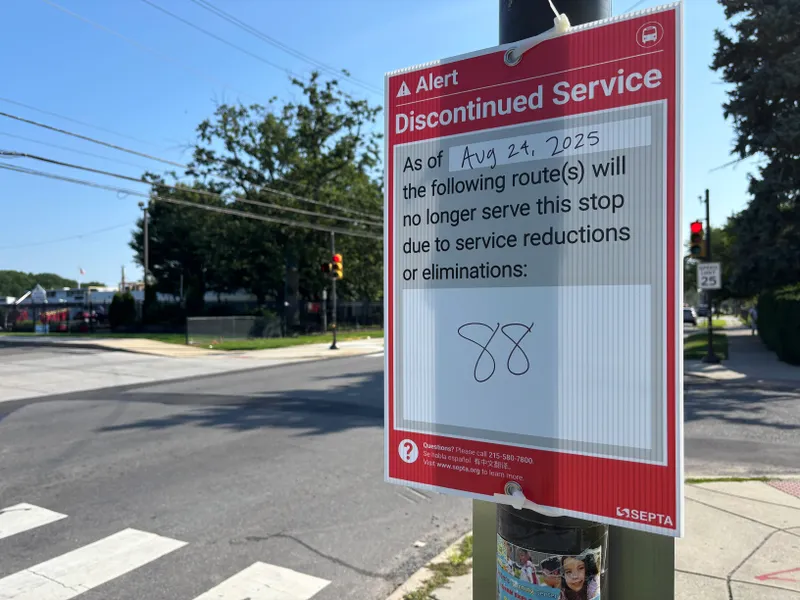
PHILADELPHIA (KYW Newsradio) — Harrisburg has failed to deliver SEPTA funding in time, so deep service cuts will take effect starting on Aug. 24, the day before school starts in Philadelphia. The Democratic-controlled Pennsylvania House passed multiple funding bills, but Republicans in the Senate rejected all of them and waited until this week to offer one of their own.
“I’m glad that the Senate Republicans have acknowledged that this is an issue, but unfortunately, the bill that they moved is not a solution,” said state Sen. Steve Santarsiero (D-Bucks County).
He said that because the Senate allotted money from the Public Transportation Trust Fund, it would have left SEPTA with the same shortfall somewhere else in its budget. However, Philadelphia’s lone Republican state Sen. Joe Picozzi said money from anywhere else would need to be offset, too.
“What are you going to cut to pay for it? That money is coming out of our general fund. It funds our veterans, our hospitals. I need to see a clear answer on what are the cuts in the general fund to make up for the revenue taken out of it,” he told NBC10.
Negotiations will continue as cuts go into effect. SEPTA is reducing service by 20%, eliminating 32 bus routes, shortening 16 others, and running less frequent service on 88 remaining lines.
On Sept. 1, a 21.5% fare increase takes effect, as well as a hiring freeze. The base fare will also increase to $2.90. Regional Rail service cuts take effect on Sept. 2.
The second phase of cuts would slash an additional 25% of service on Jan. 1, 2026. It would also eliminate five Regional Rail lines, eliminate 18 additional bus routes and the Broad-Ridge Spur, and enforce a 9 p.m. curfew on all remaining Metro and Regional Rail services.
“These cuts are gonna go into effect. This is not a bluff,” SEPTA Board member Bob Harvie said. “I hear from some of the people in Harrisburg, ‘Well, we think this is just a bluff, you’re not really gonna do these cuts.’ We don’t have a choice.”
A statement from the governor’s office said, “Governor Shapiro is working with leaders in both parties on a final budget deal that delivers critically important funding for mass transit and addresses the most pressing issues facing our Commonwealth. The Governor is in the Capitol, continuing to work at this with a relentless focus on delivering for the kids who need SEPTA to get to school, the hard working Pennsylvanians who depend on it to get to and from work, and the communities that power our economy and rely on the system. Governor Shapiro will continue working to narrow the differences between the House and the Senate in order to get this done.”
SEPTA Chief Planning and Strategy Officer Jody Holton said reduced schedule data is now available for third-party apps like Google Maps, and bus and train operators are signing up for the diminished work schedule.
"Our operators have picked from both schedules, so they're ready to go with either one. And we know which one it is now, unfortunately,” Holton said.
Deputy Chief Communications Officer Lex Powers said SEPTA ambassadors will be stationed at transit centers to let riders know which lines will no longer run and how they can make a plan B.
"It is time in that way for our riders, if you know that a route is affected or you know that your commute is affected, to plan and figure out what your choices are,” Powers said. "Service is and will be reduced network-wide, whether that's Regional Rail or our Metro system or other bus routes. And then just from that perspective, we expect there to be more crowding, longer wait times."
If funding does materialize, Powers said it would take 10 days to restore normal schedules. New printed fall schedules reflecting the service cuts are now being distributed at transit hubs.
More congestion on the roads
Some lawmakers warn that these SEPTA cuts will impact Philadelphia’s already congested roads and bridges.
“This loss of SEPTA and the additional cars on our roadways per week is a critical public safety issue,” said state Sen. Katie Muth (D-Berks, Chester, Montgomery counties).
The Delaware Valley Regional Planning Commission released a report earlier this year that found a reduction in SEPTA service will add at least 275,000 more cars on the road every day.
Another DVRPC survey found more than half of the increase in travel would happen on major highways, which will make the roads less safe and negatively affect air quality.
“Good luck parking at the airport,” Muth said on the Senate floor earlier this week. “Good luck trying to get to a doctor’s appointment on time and find parking in the city.”
A spokesperson for Philadelphia International Airport said the impact of reduced Airport Line service will create more cars on the road, adding more travel time for passengers and employees trying to get to the airport. Reduced service could also mean passengers will have to drive and park in a garage farther away from their terminal or spend more time looking for a parking spot.
